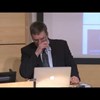genetisk

Julian Savulescu - The Future of Humans. Moral Bioenhancement
www.iffs.se Uehiro Professor of Practical Ethics at the University of Oxford. His areas of research include the ethics of genetics, research ethics, medical ethics, sports ethics and the analy
A future without Down syndrome? Ethical reflections on the development of technology
Have you used prenatal testing to determine if the fetus you or your partner is carrying has Down’s syndrome? If the answer is yes, you are not alone. The interest in genetic screening for Down’s synd

Ludvig Beckman
I am Professor in Political Science at Stockholm University. In 2000 I defended my dissertation at Uppsala University. I participate in the research project "The Boundary Problem in Democratic Theory" t

Martin Kolk
I am a demographer with an interest in all major demographic processes (fertility, mortality, union formation, and migration), often with an intergenerational component. I am also interested in if the
The Ethical Considerations of Pantropy in the Colonization of Mars
In: The Philosophy of Outer Space. Explorations, Controversies, Speculactions edited by Mirko Daniel Garasic and Marcello Di Paola. Routledge. Abstract The project of colonizing Mars poses significant cha
- CANCELLED - Ornit Shani: The Making of Popular Sovereignty in India’s Nascent Democracy
PLEASE NOTE THAT THIS SEMINAR IS CANCELLED Dr Ornit Shani, University of Haifa, Department of Asian Studies.Abstract This talk explores the genesis and first performance of the imaginary of popular sove
Should Extinction Be Forever?
Should Extinction Be Forever?, Philosophy and Technology, First online: 17 october 2015 This article will explore a problem which is related to our moral obligations towards species. Although the re-cr, (6128), 32–33, ). This article will provide an argument in favour of re-creation based on normative considerations. The environmentalist community generally accepts that it is wrong to exterminate species, for reasons beyond any instrumental value these species may have. It is often also claimed that humanity has a collective responsibility to either preserve or at least to not exterminate species. These two beliefs are here assumed to be correct. The argument presented here departs from and places these two ideas in a deontological framework, from which it is argued that when humanity causes the extinction of a species, this is a moral transgression, entailing a residual obligation. Such an obligation implies a positive duty to mitigate any harm caused by our moral failure. In light of recent scientific progress in the field of genetic engineering, it will be argued that humanity has a prima facie obligation to re-create species whose extinction mankind may have caused, also known as de-extinction.
Artificial superintelligence and its limits: why AlphaZero cannot become a general agent
AI & Society (2020) Abstract An intelligent machine surpassing human intelligence across a wide set of skills has been proposed as a possible existential catastrophe (i.e., an event comparable in val
Artificial superintelligence and its limits: why AlphaZero cannot become a general agent
in: AI & SOCIETY AbstractAn intelligent machine surpassing human intelligence across a wide set of skills has been proposed as a possible existential catastrophe (i.e., an event comparable in valueproductivedesires, or desires that can direct behavior across multiple contexts. However, productive desires cannotsui generisbe derived from non-productive desires. Thus, even though general agency in AI could in principle be created by human agents, general agency cannot be spontaneously produced by a non-general AI agent through an endogenous process (i.e. self-improvement). In conclusion, we argue that a common AI scenario, where general agency suddenly emerges in a non-general agent AI, such as DeepMind’s superintelligent board game AI AlphaZero, is not plausible.
Tackling toxins: Case studies of industrial pollutants and implications for climate policy
Regulation & Governance Abstract As scholars race to address the climate crisis, they have often treated the problem as sui generisand have only rarely sought to learn from prior efforts to make indu








